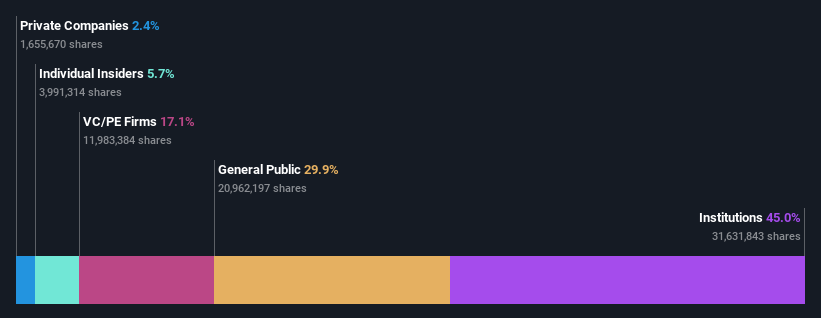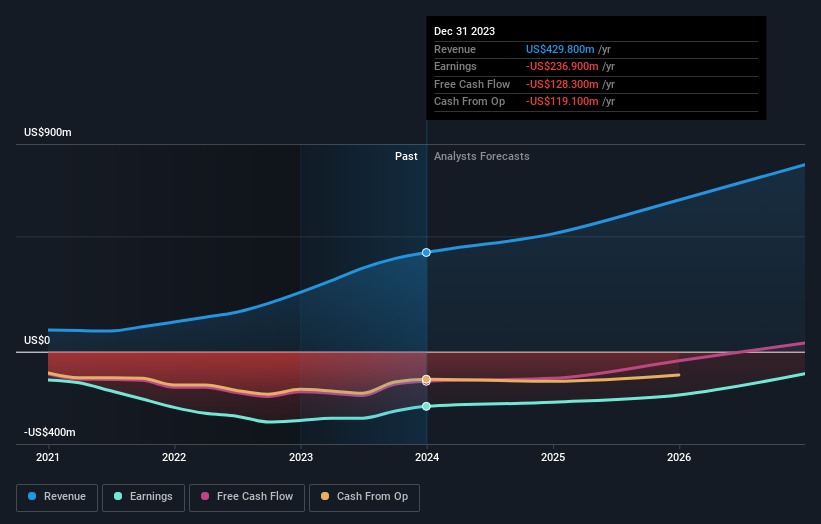Stock Analysis
- United States
- /
- Insurance
- /
- NYSE:LMND
Institutional owners may ignore Lemonade, Inc.'s (NYSE:LMND) recent US$60m market cap decline as longer-term profits stay in the green

Key Insights
- Institutions' substantial holdings in Lemonade implies that they have significant influence over the company's share price
- The top 9 shareholders own 51% of the company
- Recent purchases by insiders
A look at the shareholders of Lemonade, Inc. (NYSE:LMND) can tell us which group is most powerful. We can see that institutions own the lion's share in the company with 45% ownership. In other words, the group stands to gain the most (or lose the most) from their investment into the company.
No shareholder likes losing money on their investments, especially institutional investors who saw their holdings drop 5.1% in value last week. Still, the 23% one-year gains may have helped mitigate their overall losses. But they would probably be wary of future losses.
Let's delve deeper into each type of owner of Lemonade, beginning with the chart below.
View our latest analysis for Lemonade

What Does The Institutional Ownership Tell Us About Lemonade?
Institutions typically measure themselves against a benchmark when reporting to their own investors, so they often become more enthusiastic about a stock once it's included in a major index. We would expect most companies to have some institutions on the register, especially if they are growing.
As you can see, institutional investors have a fair amount of stake in Lemonade. This suggests some credibility amongst professional investors. But we can't rely on that fact alone since institutions make bad investments sometimes, just like everyone does. When multiple institutions own a stock, there's always a risk that they are in a 'crowded trade'. When such a trade goes wrong, multiple parties may compete to sell stock fast. This risk is higher in a company without a history of growth. You can see Lemonade's historic earnings and revenue below, but keep in mind there's always more to the story.

We note that hedge funds don't have a meaningful investment in Lemonade. Our data shows that Softbank Group Capital Limited is the largest shareholder with 17% of shares outstanding. The Vanguard Group, Inc. is the second largest shareholder owning 7.4% of common stock, and Baillie Gifford & Co. holds about 6.5% of the company stock.
We did some more digging and found that 9 of the top shareholders account for roughly 51% of the register, implying that along with larger shareholders, there are a few smaller shareholders, thereby balancing out each others interests somewhat.
While it makes sense to study institutional ownership data for a company, it also makes sense to study analyst sentiments to know which way the wind is blowing. Quite a few analysts cover the stock, so you could look into forecast growth quite easily.
Insider Ownership Of Lemonade
While the precise definition of an insider can be subjective, almost everyone considers board members to be insiders. Management ultimately answers to the board. However, it is not uncommon for managers to be executive board members, especially if they are a founder or the CEO.
Most consider insider ownership a positive because it can indicate the board is well aligned with other shareholders. However, on some occasions too much power is concentrated within this group.
Our most recent data indicates that insiders own some shares in Lemonade, Inc.. The insiders have a meaningful stake worth US$65m. Most would see this as a real positive. If you would like to explore the question of insider alignment, you can click here to see if insiders have been buying or selling.
General Public Ownership
The general public, who are usually individual investors, hold a 30% stake in Lemonade. This size of ownership, while considerable, may not be enough to change company policy if the decision is not in sync with other large shareholders.
Private Equity Ownership
With a stake of 17%, private equity firms could influence the Lemonade board. Some investors might be encouraged by this, since private equity are sometimes able to encourage strategies that help the market see the value in the company. Alternatively, those holders might be exiting the investment after taking it public.
Next Steps:
It's always worth thinking about the different groups who own shares in a company. But to understand Lemonade better, we need to consider many other factors. For instance, we've identified 2 warning signs for Lemonade that you should be aware of.
But ultimately it is the future, not the past, that will determine how well the owners of this business will do. Therefore we think it advisable to take a look at this free report showing whether analysts are predicting a brighter future.
NB: Figures in this article are calculated using data from the last twelve months, which refer to the 12-month period ending on the last date of the month the financial statement is dated. This may not be consistent with full year annual report figures.
Valuation is complex, but we're helping make it simple.
Find out whether Lemonade is potentially over or undervalued by checking out our comprehensive analysis, which includes fair value estimates, risks and warnings, dividends, insider transactions and financial health.
View the Free AnalysisHave feedback on this article? Concerned about the content? Get in touch with us directly. Alternatively, email editorial-team (at) simplywallst.com.
This article by Simply Wall St is general in nature. We provide commentary based on historical data and analyst forecasts only using an unbiased methodology and our articles are not intended to be financial advice. It does not constitute a recommendation to buy or sell any stock, and does not take account of your objectives, or your financial situation. We aim to bring you long-term focused analysis driven by fundamental data. Note that our analysis may not factor in the latest price-sensitive company announcements or qualitative material. Simply Wall St has no position in any stocks mentioned.

Simply Wall St
About NYSE:LMND
Lemonade
Lemonade, Inc. provides various insurance products through various channels in the United States, Europe, and the United Kingdom.
Adequate balance sheet with concerning outlook.
